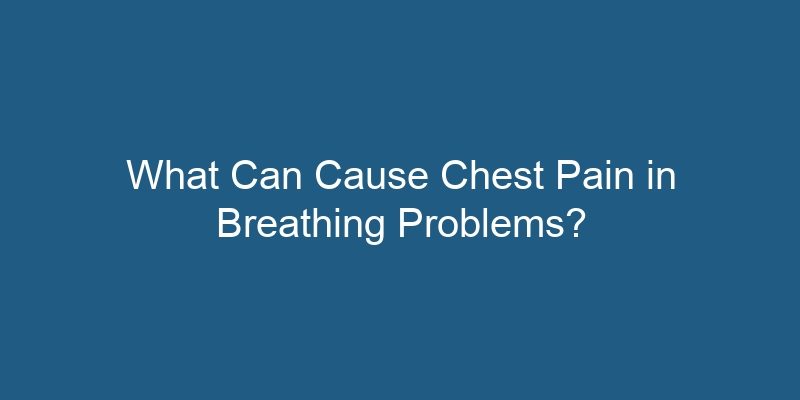Chest pain is a common symptom that can arise from various underlying causes. When it occurs in conjunction with breathing difficulties, it can be particularly concerning. In this article, we will explore the potential causes of chest pain in relation to respiratory problems, providing detailed explanations for each subtopic.
- 1. Introduction
- 1.1 Importance of Identifying the Cause
- 2. Common Causes of Chest Pain in Breathing Problems
- 2.1 Musculoskeletal Causes
- 2.1.1 Costochondritis
- 2.1.2 Rib Fractures
- 2.1.3 Muscle Strains
- 2.2 Respiratory Infections
- 2.2.1 Pneumonia
- 2.2.2 Bronchitis
- 2.3 Pulmonary Embolism
- 2.4 Pleurisy
- 3. Seeking Medical Attention
- 3.1 Importance of Medical Evaluation
- 3.2 Diagnostic Process
- 4. Frequently Asked Questions (FAQs)
- FAQ 1: Can anxiety cause chest pain during breathing?
- FAQ 2: Can asthma cause chest pain when breathing?
- FAQ 3: Are there any home remedies for chest pain related to breathing difficulties?
- FAQ 4: Can heart problems cause chest pain during breathing?
- FAQ 5: What should I do if I experience sudden severe chest pain while breathing?
- FAQ 6: Can acid reflux cause chest pain during breathing?
- FAQ 7: Can smoking contribute to chest pain during breathing?
- 5. Conclusion
1. Introduction
Understanding the relationship between chest pain and breathing difficulties is crucial in determining the underlying cause and seeking appropriate medical attention. In this section, we will provide an overview of the topic and its significance.
1.1 Importance of Identifying the Cause
Chest pain associated with breathing problems can be a sign of a serious underlying condition. Recognizing the cause early on can help in prompt diagnosis and treatment, preventing potential complications.
2. Common Causes of Chest Pain in Breathing Problems
There are several factors that can contribute to chest pain during respiratory difficulties. In this section, we will delve into each potential cause in detail.
2.1 Musculoskeletal Causes
Musculoskeletal issues can lead to chest pain when breathing. Conditions such as costochondritis, rib fractures, and muscle strains can cause discomfort in the chest area. It is important to differentiate between musculoskeletal causes and other potential underlying causes.
2.1.1 Costochondritis
Costochondritis is inflammation of the cartilage that connects the ribs to the breastbone. This inflammation can result in chest pain, particularly during deep breathing or physical activity.
2.1.2 Rib Fractures
Rib fractures can occur due to trauma or repetitive strain. Breathing deeply can exacerbate the pain associated with rib fractures, making it an important consideration when experiencing chest pain during respiration.
2.1.3 Muscle Strains
Muscle strains in the chest area can cause localized pain that worsens with breathing or movement. These strains can result from activities such as lifting heavy objects or sudden movements.
2.2 Respiratory Infections
Respiratory infections, such as pneumonia or bronchitis, can cause chest pain when breathing. These infections often lead to inflammation in the lungs or airways, resulting in discomfort during respiration.
2.2.1 Pneumonia
Pneumonia is an infection that affects the air sacs in one or both lungs. Chest pain experienced during breathing can be a result of the inflammation and irritation caused by the infection.
2.2.2 Bronchitis
Bronchitis is characterized by inflammation of the bronchial tubes. This inflammation can cause chest pain, particularly when taking deep breaths or coughing.
2.3 Pulmonary Embolism
A pulmonary embolism occurs when a blood clot blocks one of the arteries in the lungs. This can result in chest pain, shortness of breath, and difficulty breathing. Prompt medical attention is essential in such cases, as pulmonary embolism can be life-threatening.
2.4 Pleurisy
Pleurisy is the inflammation of the membranes that surround the lungs. This condition can cause sharp chest pain, particularly during deep breaths or coughing.
3. Seeking Medical Attention
It is important to seek medical attention when experiencing chest pain in conjunction with breathing difficulties. In this section, we will discuss the importance of consulting a healthcare professional and the steps involved in the diagnostic process.
3.1 Importance of Medical Evaluation
Given the potential seriousness of chest pain and breathing difficulties, it is crucial to consult a healthcare professional for an accurate diagnosis. A thorough evaluation can help determine the underlying cause and guide appropriate treatment.
3.2 Diagnostic Process
The diagnostic process may involve various examinations and tests. These can include physical examinations, imaging studies such as X-rays or CT scans, blood tests, and pulmonary function tests. The specific tests conducted will depend on the suspected cause of the symptoms.
4. Frequently Asked Questions (FAQs)
FAQ 1: Can anxiety cause chest pain during breathing?
Yes, anxiety can indeed cause chest pain during breathing. Anxiety and panic attacks can lead to chest tightness and discomfort, often accompanied by difficulty breathing. It is important to differentiate between anxiety-induced chest pain and other potential causes.
FAQ 2: Can asthma cause chest pain when breathing?
Yes, asthma can cause chest pain during breathing. This pain can arise due to bronchial constriction and inflammation in the airways, resulting in discomfort during respiration. Proper management of asthma is crucial in minimizing such symptoms.
FAQ 3: Are there any home remedies for chest pain related to breathing difficulties?
While it is important to consult a healthcare professional for proper diagnosis and treatment, certain measures can provide temporary relief. These include practicing deep breathing exercises, applying a warm compress to the affected area, and maintaining good posture.
FAQ 4: Can heart problems cause chest pain during breathing?
Yes, heart problems can manifest as chest pain during breathing. Conditions such as angina or a heart attack can lead to discomfort in the chest area, often accompanied by shortness of breath. It is crucial to seek immediate medical attention in such cases.
FAQ 5: What should I do if I experience sudden severe chest pain while breathing?
If you experience sudden severe chest pain while breathing, it is important to seek emergency medical assistance immediately. Call your local emergency number or go to the nearest emergency room. Do not ignore or delay seeking help in such situations.
FAQ 6: Can acid reflux cause chest pain during breathing?
Yes, acid reflux can cause chest pain during breathing. This occurs when stomach acid flows back into the esophagus, resulting in irritation and discomfort in the chest area. Managing acid reflux through lifestyle changes and medication can help alleviate such symptoms.
FAQ 7: Can smoking contribute to chest pain during breathing?
Yes, smoking can contribute to chest pain during breathing. Smoking damages the lungs and airways, leading to respiratory problems and potential discomfort in the chest area. Quitting smoking is crucial for overall respiratory health.
5. Conclusion
When experiencing chest pain in conjunction with breathing difficulties, it is essential to identify the underlying cause. Musculoskeletal issues, respiratory infections, pulmonary embolism, and pleurisy are among the potential causes. Seeking medical attention and undergoing proper diagnostic evaluations are crucial in determining the cause and guiding appropriate treatment. By addressing chest pain related to breathing problems promptly, individuals can ensure their overall well-being and prevent potential complications.










